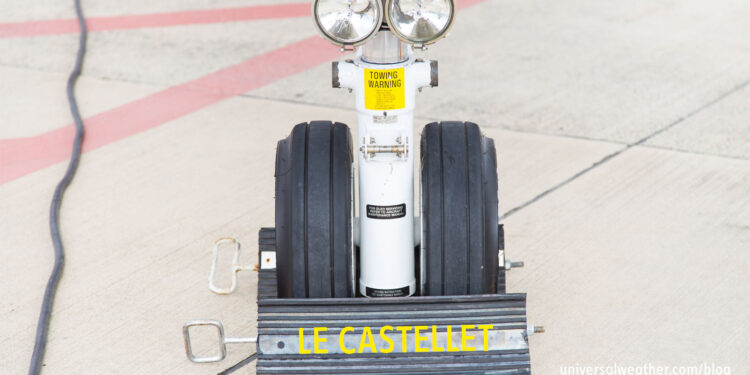Business Aircraft Ops to the French Riviera via Le Castellet: Part 2 – Operating Considerations

This is a post by author Isabelle Canton. Isabelle is the senior Universal Aviation representative – south of France for Universal Aviation France, which has aircraft ground handling facilities in Paris, Le Bourget and Le Castellet. Isabelle is an expert on business aircraft operations in southern France and can be contacted at cantonisabelle@universalaviation.aero.
This business aviation blog post continues from our article last week, entitled “Business Aircraft Ops to the French Riviera via Le Castellet: Part 1 – Airport Considerations.”
Le Castellet (LFMQ) is a user-friendly airfield and a popular alternate parking choice for nearby French Riviera locations. While there are occasional issues with Customs, Immigration, and Quarantine (CIQ) availability – and rare cases when weather conditions may cause you to divert – LFMQ is a top choice for many business aircraft operators.
The following is an overview of what you need to know:
1. Slot, PPR, and permit requirements
No airport slots or Prior Permissions Required (PPRs) are needed for LFMQ. You must, however, provide at least 24 hours’ advance notification if you’re operating a non-Schengen flight so that CIQ services can be set up, and airport hours can be extended if required. Landing permits for France are needed for charter (non-scheduled commercial) flights, but not for private non-revenue operations. Five business days’ lead time is recommended because charter permits and documentation requirements can be extensive. For more information on charter landing permits for France, see our article entitled “Tips on Flight Permits/PPRs for France.”
2. CIQ procedures
Inbound/outbound CIQ clearance is not needed for flights from within the Schengen region, including reposition flights from locations such as LFMN. If yours is a non-Schengen flight, CIQ clearance must be requested a minimum of 24 business hours in advance. It’s recommended, however, to provide 48 business hours’ notice as customs/immigration authorities are not based at this airport and must commute from Toulon (LFTH). If 24 hours’ notice is not given, you will not be permitted to operate to LFMQ. Be aware, however, that there are times when CIQ may not be possible to arrange due to lack of available agents at LFTH.
3. Onboard CIQ clearance
CIQ clearance is normally accomplished onboard the aircraft, rather than in the terminal, but this is up to customs/immigration officers on site. Clearance for non-Schengen flights usually takes anywhere from five to 45 minutes depending on number of passengers, volume of luggage, and any additional requirements of the local inspectors, such as declaring items brought into the country. Vehicles can pick up/drop off passengers at the aircraft with no special permission (or vehicle/driver pre-approvals) to do so. Valid passports and appropriate Schengen visas, if required, are needed because visas on arrival are not possible. Be aware that CIQ officials at LFMQ conduct random in-depth checks of passengers/crew and aircraft from time to time.
4. CIQ documentation
No aircraft documentation is required for domestic or Schengen flights to/from LFMQ. For non-Schengen flights, a crew/passenger list must be forwarded to CIQ at least 24 hours prior to the estimated time of arrival. Customs/immigration will decide either to pre-clear your arrival or to send agents to meet your aircraft at LFMQ. Note that, if you change the schedule of a non-Schengen flight, you’ll need to allow 24 hours for revision of CIQ arrangements. For departure, CIQ will need your exact schedule, along with crew/passenger information, and it needs to be sent at least 24 hours in advance. Be sure to allow at least 24 hours lead time for any change to schedule. Short-notice arrival or departure revisions may be possible, but it’s at discretion of customs/immigration to approve/disapprove your request.
5. Agricultural regulations
Domestic and Schengen flights arrive in LFMQ with no agricultural inspections/restrictions. Non-Schengen operations are not permitted to offload meats, dairy products, or eggs. With prior arrangement, however, you may be approved to bring in special passenger meals (for medical purposes) or to store certain catering at the airport.
Conclusion
To avoid CIQ availability issues with non-Schengen flights, many operators choose to land and clear into the EU at an enroute airport. That way, they can land at LFMQ without CIQ requirements or 24-hour lead time. Likewise, on departure, it’s often preferable to depart as a Schengen flight with fuel/catering uplift at an airport such as Nice (LFMN) or another location on the planned departure routing.
Questions?
If you have any questions about this blog article or would like assistance planning your next trip to Le Castellet or southern France, contact me at cantonisabelle@universalaviation.aero.




